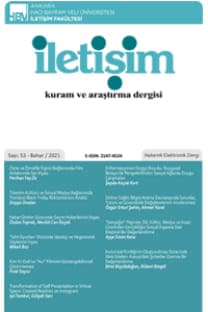Kurumsal İtibar Açısından Sosyal Sorumluluk Uygulamaları: Türkiye’deki Çevreci Sivil Toplum Örgütleri Üzerine Bir Araştırma
Social Responsibility Practices Within the Context of Corporate Reputation: A Research on the Environmentalist Non-Governmental Organizations in Turkey
___
- Akım, F. (2010). Sağlık alanında gerçekleştirilen sosyal sorumluluk kampanyalarının bireylerde farkındalık ve davranış değişikliği yaratma etkisi:”Kalbini sev kırmız giy kampanyası” üzerine bir değerlendirme, İletişim Fakültesi Dergisi, 38.
- Bear, S., Rahman, N., Post, C., (2010). The ımpact of board diversity and gender composition on corporate social responsibility and firm reputation. Journal of Business Ethics, 97, 207-221.
- Bromley, D.B. (2001). Relationships between personal and corporate reputation. European Journal of Marketing,35(3/4), 316-334.
- Biber, A. (2002). Halkla ilişkilerde sosyal sorumluluğun oluşumu ve Türkiye’de sivil toplum örgütleri’nin rolü.Yayımlanmamış Doktora Tezi, Gazi Üniversitesi Sosyal Bilimler Enstitüsü, Ankara.
- Biber, A. (2006). Sivil Toplum Örgütlerinde Halkla İlişkiler.(Birinci Baskı). Ankara: Nobel Yayın.
- Biber, A. (2012). Halkla İlişkilerde Teorik Bir Çerçeve. Ankara: Vadi Yayınları.
- Davis, K. (1973). The case for and against business assumption of social responsibilities. Academy of Management Journal, 16(2), 312-322.
- Dinçer, Ö. (1998). Stratejik yönetim ve işletme politikası(5.Baskı).İstanbul: BetaBasımYayım.
- Fombrun, C.J (1996). Reputation: Realizing Value From The Corporate Image, Boston: Harvard Business School Press
- Fombrun, C.J. ve Foss, C.B. (2001). The reputation quotient, Part 1: Developing a reputation quotient. The Gauge: Newsletter ofWorldwide Communications Research, 14(3), 1-4.
- Fombrun, C. J., Van Riel, C. B. (2004). Fame &Fortune: How Successful Companies Build Winning Reputations. New Jersey: FT Press.
- Gergely, T. (2012). Gerçekten sorumluluk sahibi işletmeler. İstanbul: Türkiye Kurumsal Sosyal Sorumluluk Derneği.
- Green, S. P. (1996). Reputation Risk Management, Şirket Ününü Korumanın Yolları. (Çev. A. Ersoy). İstanbul: Milliyet Yayınları.
- Grunig, J. E. (2005). Halkla İlişkiler ve İletişim Yönetiminde Mükemmellik, Çev. Elif Özsayar, İstanbul: Rota Yayınları.
- Hirschland, M. J. (2006). Corporate Social Responsibility and the Shaping of Global Public policy. (First Edition). Palgrave Macmillan.
- Kadıbeşegil, S. (2006). İtibar Yönetimi. İstanbul: MediaCat Yayınları.
- Keyman, F. (2006). Türkiye’de sivil toplumun serüveni: İmkânsızlıklar içinde bir vaha. Ankara, Sivil Toplum Geliştirme Merkezi Yayınları. http://panel. stgm. org. tr/vera/ app/var/files/t/u/turkiye-de-sivil-toplumun-seruveni. pdf.
- Kotler P. ve Lee N. (2006). Kurumsal sosyal sorumluluk.(çev: Sibel Kaçamak). İstanbul: Mediacat Yayınları.
- Kuyucu, B. A. (2003). Kurumlarda başarılı ve etkin itibar yönetimi., Yılmaz Argüden (Editör). İtibar Yönetimi.(1. Basım). İstanbul: Arge Danışmanlık Yayınları.
- L’Etang, J. (2002). Kurumsal sosyal sorumluluk ve halkla ilişkiler etiği. J. L’Etang ve M. Pieczka (editörler). Halkla İlişkilerde Eleştirel Yaklaşımlar. Ayşe Elif Emre (çev.). Ankara. Vadi Yayınları.
- Norusis, M. J. (1991). SPSS for Windows. Chichago: SPSS Inc.
- Özbay, D., Selvi, Y. (2014). Etik kurumsal itibar ve sermaye piyasasına etkisi. H. Sumer ve H. Pernsteiner (Editörler). İtibar Yönetimi (1. Baskı). İstanbul. Beta Yayınevi.
- Özgen, E. (2006).Kurumsal Sosyal Sorumluluk Projeleri. İstanbul: Maviağaç.
- Puncheva, P. (2008). The role of corporate reputation in the stakeholder decisionmaking process.Business & Society, 47 (3), 272-290.
- Schultz, M., Hatch, M.J., Larsen, M.H., (2000). The Expressive Organization:Linking, Identity, Reputation and The Corporate Brand.New York: Oxford University Press.
- Ural, A., Kılıç, İ. (2005). Bilimsel Araştırma Süreci ve SPSS ile Veri Analizi. Ankara: Detay Yayınevi.
- Van Het Hof, S. D. (2015). Şirketler ve topluma karşı sorumlulukları. Van Het Hof, S. D., Hoştut, S. (Editörler). Kurumsal sosyal sorumluluk, kavramlar, uygulama ve örnekler, (1. Basım).İstanbul: Nobel Yayıncılık.
- Van Marrewijk, M. (2003). Concepts and definitions of CSR and corporate sustainability: Between agency and communion. Journal of Business Ethics,44(2), 95- 105.
- Wartick, S.L. (2002). Measuring corporate reputation: Definition and data. Business & Society, 41(4), 371-392.
- İnternet: Aksu, N. (2017).İş dünyası sürdürülebilirliğin neresinde http:// www.repman.com.tr/tr/wp-content/uploads/2017/04/RepMan-Forum-2017_ Aras%CC%A7t%C4%B1rma-Sunumu.pdf. Erişim Tarihi: Nisan 2017
- İnternet: Türkiye KSS Derneği (2008).Türkiye’de kurumsal sosyal sorumluluk değerlendirme raporuWeb:http://kssd.org/site/dl/uploads/CSR_Report_in_ Turkish.pdf. Erişim Tarihi: 10 Nisan 2016
- İnternet:Özturan, P. (2011). Kurumsal sosyal sorumluluk vaka analizi çalışması: Türkiye’deki 5 şirket ve 5 STK’nın incelenmesi. İstanbul: Türkiye Üçüncü Sektör vakfıhttp://www.step.org.tr/images/UserFiles/File/KSS%20Vaka%20Analizi_P_ Ozturan%20(2).pdf. Erişim Tarihi: 08 Mayıs 2016
- Yayın Aralığı: 3
- Başlangıç: 1983
- Yayıncı: Ankara Hacı Bayram Veli Üniversitesi İletişim Fakültesi
Hanife GÜZ, Şengül ALTAN ARSLAN
Türk - Amerikan İlişkilerinin Türk Sinemasındaki Seyri
Mustafa UYAR, Muhsin ÇİNAR, Murat ERDOĞDU, Murat KOÇYİĞİT
Televizyon İzleme Alışkanlıklarında Parasosyal Etkileşim Etkisi İle Yalnızlık Arasındaki İlişki
Türkiye’de YouTube Yayıncılığı ve YouTuber Olmak
Erol İLHAN, Adalet GÖRGÜLÜ AYDOĞDU
Yeni Medya, Temel Bileşenleri ve Sanatın Değişen Estetik Dili
